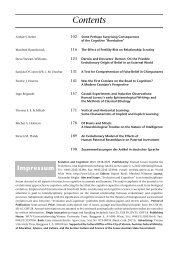The Seven Sins of Evolutionary Psychology - Konrad Lorenz Institute
The Seven Sins of Evolutionary Psychology - Konrad Lorenz Institute
The Seven Sins of Evolutionary Psychology - Konrad Lorenz Institute
Create successful ePaper yourself
Turn your PDF publications into a flip-book with our unique Google optimized e-Paper software.
A Continuing Critique <strong>of</strong> <strong>Evolutionary</strong> <strong>Psychology</strong>perceptual/motor proclivities enabling the cortex tomirror perceived actions (GALLESE/GOLDMAN 1998).SEGERSTRÅLE correctly points out that we do “accusethe evolutionary psychologists <strong>of</strong> ignoring awhole body <strong>of</strong> evidence that actually exists”. SEGER-STRÅLE also suggests possible reasons for why evolutionarypsychologists have failed to include datafrom comparative neuroscience in their recent syntheses(COSMIDES/TOOBY 2000). While we agree thatnurturing a new scientific field is taxing, we feel thatfailure to include the large body <strong>of</strong> neuroscientificdata in attempting to explain the ultimate biologicalcausation <strong>of</strong> human behavior cannot be attributedto the business <strong>of</strong> a ‘multi-front battle’—it is simplyneglect (probably arising largely from the traditionalsocial science bias which tends to intentionally ignorefacts derived from other animals). We also appreciatethat in doing this, evolutionary psychologistsare no different than many other cognitivepsychologists who developed new and dubious anthropocentric,intellectual traditions after they becamefed up with the all too many abundant sins <strong>of</strong>many 20 th century behaviorists (for an overview, seePANKSEPP 1990).We sympathize with the multi-front battle that<strong>Evolutionary</strong> <strong>Psychology</strong> presently has to wage withmany other disciplines. We who believe that studyinganimal mind/ brains will tell us a great deal abouthuman nature have an even larger challenge to overcome.Our battle is against the prevailing anthropocentricperspective <strong>of</strong> evolutionary psychology, notto mention psychology in general. Once it is acceptedthat many <strong>of</strong> the sociobiology-type systemsthat humans possess reside in homologous subcorticalareas we share with other animals, the temptationto find ‘modules’ in the higher reaches <strong>of</strong> thehuman mind/brain should diminish. This is theneurodevelopmental issue (and blessing) that liberatesus from any rigid determinism. Again, we haveno doubt that there is a great deal <strong>of</strong> sensory andmotor specialization in the cortex, including face-,odor-, posture-, touch-, and voice-recognition dispositions,but we see no evidence that these functionsare sociobiological in any deep sense <strong>of</strong> the word,nor are they uniquely human. Yes, language comesclosest to a cortical, sociobiological ‘module’, but letus appraise the evidence cautiously. As SEGERSTRÅLE(2000) understands as well as anyone, much <strong>of</strong> theconfusion in this area has arisen from our politicalurges and convictions (<strong>of</strong>ten unstated) rather thanfrom our willingness to confront all the evidence inunbiased ways. As she says, it is indeed time to “relaxthe modularity idea”.Linda Mealey: What’s in a Word?Linda MEALEY provides a useful and balanced overview<strong>of</strong> the general arguments, as well as variousparticulars. She gracefully navigates the pragmaticmiddle course, highlighting important empiricaland conceptual landmarks along the way. We willonly reinforce her views by elaborating on a couple<strong>of</strong> related topics that concern us most. We also haveconsiderable concern with her advocacy <strong>of</strong> the traditional‘modular’ point <strong>of</strong> view that, in our estimation,adds nothing substantive to an evolutionaryanalysis <strong>of</strong> brain functions (even though it mayhave seemed like a good semantic way to start in themidst <strong>of</strong> massive ignorance).Of all the ‘sins’, the species-centric perspective isforemost on our minds. It is simply unconscionable,considering all that we presently know about thegenetic and epigenetic construction <strong>of</strong> the brain,that throughout the past three decades practically allvariants <strong>of</strong> psychology have ignored the evidencegained from our fellow creatures (at least as a function<strong>of</strong> published words). <strong>The</strong> failure <strong>of</strong> academicpsychology to assimilate information from the neurosciencerevolution has been documented severaltimes via citation analyses, and many <strong>of</strong> us believethat psychology simply cannot be a solid basic scienceunless it begins to incorporate such issues intoits framework.This complaint should be especially poignant forevolutionary psychology, for many <strong>of</strong> our mind/brain abilities are shared with other animals. Eventhough we clearly outdistance most other species inthe complexity and refinement <strong>of</strong> our cognitiveabilities, To the best <strong>of</strong> our knowledge, the mushrooming<strong>of</strong> the requisite human neocortex occurredin response to fairly minimal genomic changes. Inother words, our cortical expansions are the result<strong>of</strong> a relatively modest number <strong>of</strong> heterochronic genetic/regulatorychanges rather than any type <strong>of</strong>major re-engineering that accommodated new anddistinct cerebral skills (even though such skills mostassuredly do emerge from the epigenetic interactions<strong>of</strong> our massive brains with our bodily abilities).In short, the highly specialized functions <strong>of</strong> the oldmammalianbrain, situated largely subcortically,took most <strong>of</strong> evolutionary time to be constructed. Ifwe truly want to scientifically understand the foundation<strong>of</strong> human nature, a proportionate amount <strong>of</strong>research effort should be devoted, in psychology, toelucidating these functions. Instead, within psychologysuch efforts have been a drop in the bucket.Only a few investigators gathered around the deepEvolution and Cognition ❘ 59 ❘ 2001, Vol. 7, No. 1








